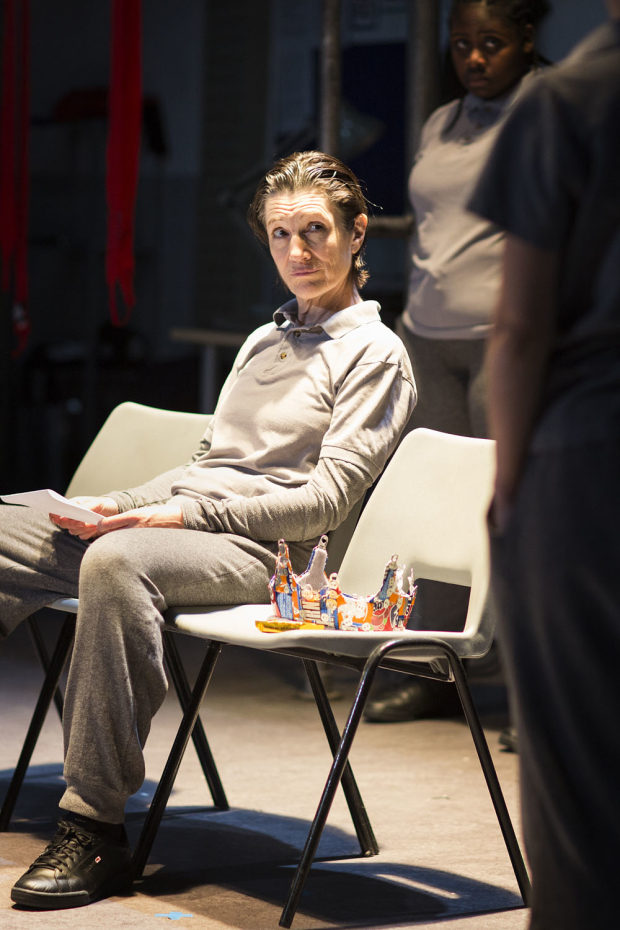Review: The Tempest in the Donmar Trilogy (King's Cross Theatre)
There’s a rough magic to Phyllida Lloyd‘s radical and revelatory reworking of three Shakespeare plays: Julius Caesar, Henry IV and The Tempest. What she does seems so simple, using everyday props and a bleak setting. Yet to place the plays within a women’s prison with an all-female cast, transforms their effect and meaning. They come vividly and wonderfully to a different life.
The frame of the prison was originally – in 2012 when Julius Caesar was first seen – simply to give a realistic context for women taking every part. But as the project has progressed, and with the addition of The Tempest this year, it has become a way of making the plays burrow into contemporary hearts and minds.
The audience are led into the theatre at King’s Cross by prison guards; the viewing conditions, with grated doors up high and bum-numbing seats all around, is realistically spartan. At the beginning of each play, a character, based on a real life prisoner, introduces the action, and explains its relevance to her: Julius Caesar helped one find her voice; Henry allowed a drug addict to believe in the possibility of reformation. Finally The Tempest is introduced by Hannah, played by Harriet Walter, the most pervasive character of the trilogy, a lifer with no hope of release. The play becomes one about the daily need to find forgiveness.
Then the prisoners line up, in grey hoodies and baggy track suit bottoms, and the plays begin. They are performed in brilliantly filleted, speedy versions, with the odd interruption as prison life intrudes on the action. So at the end of Julius Caesar, for example, Hannah/Walter strides down the steps shouting: "It’s not over. The world is shit. Do something about it. Fuck you!" At the close of The Tempest, she is surrounded by the voices of the people she has worked her magic on, those she has helped on the road to freedom, while she remains imprisoned with her books.
This sense that Shakespeare is embedded in our reactions to our problems is one of the great benefits of the staging, emphasising his essential vitality. Another is the pure, bravura clarity of the telling, its imaginative richness, which stretches all the way from Bunny Christie and Chloe Lamford‘s designs, to the intelligent use of music, to Ann Yee’s magnificent movement direction which turns a battle into a stylised boxing match and the arrival of a group of sprites into a street dance.
Repeatedly the confidence of the effects takes the breath away. The way, for example, that the buckram coats of Falstaff and his mates in Henry IV become high viz jackets, or the changing of a dressing gown into a robe of state, or red rubber gloves into bloody hands in Julius Caesar. In The Tempest, the audience are given torches to provide the pinpricks of light which surround Prospero as he casts off his powers.
The images contribute to the telling of the story; so do the jokes, including one about Donald Trump. Yet for all the irreverence, the poetry is preserved. Scenes often take place on a bare stage, relying on the power of the acting to compel attention.
By The Tempest, the worlds of the prison and of the play have seeped into one another. The prison setting has become a metaphor for Prospero’s isolation and so the storm is one of protest as the inmates battering the gates, crying for freedom; the sea is a swirl of rubbish. When Prospero punishes his enemies, he brings them inside, and their actual imprisonment becomes the state of horror from which he must release them. The theme of children lost and loved takes on added poignancy in the context of a setting where women are separated from the children they adore.
It’s as beautifully staged as everything else, though is perhaps inevitably less fluent than the first two plays, well-oiled from performance. But Walter is a superbly compassionate Prospero controlling all around her with a kind of aching sorrow.
The total joy of the entire event is seeing a group of women actresses liberated to perform Shakespeare with such profound insight and understanding. The ensemble – effortlessly multi-racial. attractively energetic, supremely skilled – is superb, but individuals do stand out.
Jade Anouka makes Mark Antony a charismatic manipulator, Hotspur a dashing brawler and Ariel a gentle spirit; Martina Laird brings both Cassius and the devious Worcester to scheming life; Clare Dunne is a terrifying Octavius Caesar, shooting prisoners at will, and a riveting Hal, growing in confidence with every scene. Karen Dunbar casts humorous insight on each part she plays. Leah Harvey’s stage debut as Miranda is full of innocent abandon; her courtship by Sheila Atim jelly-limbed, excitable Ferdinand one of the evening’s highlights.
At the heart of the whole, stands Harriet Walter, quietly riveting as misguided Brutus fighting for justice, heartbroken as Henry, and – best of all – deeply moving as Prospero. She is the most wonderful listener, responding to everything with profound sensitivity, holding together the complex web of emotions that these outstanding productions weave.
It’s an exhilarating day – six hours that celebrate the imaginative power of theatre and the wonder of the women working within it.
The Tempest runs at King's Cross Theatre until 15 December. Julius Caesar and Henry IV run in rep until December 17.











